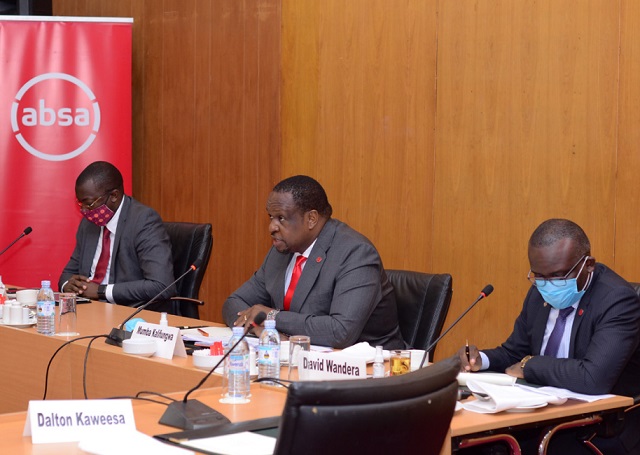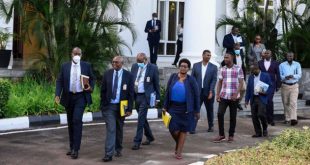
Lending to be directed to sectors crucial to socio-economic development including SMEs, trade, industry and agri-business
Kampala, Uganda | JULIUS BUSINGE | Interest rates have risen over the past two quarters this year but commercial bank executives say current levels are still fair to both lenders and borrowers.
The latest Bank of Uganda Monetary Policy report for October shows commercial bank lending interest rates rose from an average of 18.9% in the quarter to May to 20% in the quarter to August this year amidst the lowest ever central bank rate of 7%.
This development, according to analysts, could slow down recovery of the economy.
But Mumba Kalifungwa, the managing director at Absa Bank Uganda, said during a breakfast meeting in Kampala on Nov.11 that the cost of borrowing is fair going by the current cost of doing business in the east African nation.
“(However) I would like to reiterate our commitment to the socio-economic growth of Uganda as a key player in the banking and financial services sector,” he said.
Kalifungwa was speaking at a discussion on the ‘Impact of COVID-19 on key sectors of the economy and the role of banking in economic recovery that was attended by business reporters and editors.
The BoU executives in July this year complained about commercial banks reluctance to lower interest rates for customers amidst consistent reduction in the central bank’s policy rate – the CBR.
“It is disheartening to see that commercial banks have not reduced lending rates in tandem with the CBR despite several discussions with the Uganda Bankers’ Association,” BoU Governor Emmanuel-Tumusime Mutebile said, in reference to the average interest rates of 19% that commercial banks were charging customers on loans at the time.
However, some lenders have lowered their interest rates to prime borrowers to as low as 16% per annum.
In a recent interview with this reporter, Elly Karuhanga, the chairperson of the Private Sector Foundation Uganda, said his members were facing credit access constraints from Uganda’s development bank, and were largely depending on commercial banks whose interest rates were high.
Absa’s intervention
Kalifungwa revealed that cautious lending will now be directed to sectors crucial to socio-economic development including trade, industry, agri-business, energy, small and medium enterprises and infrastructure.
He said under their credit relief support programme, the bank has so far provided support to 1,500 customers across both retail and corporate segments.
He said the bank has also adopted the approach of developing holistic and personalised value propositions regarding financial and business advisory aspect considering the unique circumstances of their customers.
Kalifungwa said the bank’s interventions in the sector are also currently focused on providing access to export markets for agricultural commodities which has so far yielded results with commodities like coffee, soya, simsim and chia seeds.
With this approach, Kalifungwa said, they have found unique solutions to address the challenges that have traditionally inhibited access to finance for both primary and secondary agriculture players that include lack of collateral or tangible assets.
“With our model, we are able to provide secondary agriculture players with structured trade financing to access export markets and in addition, provide short term working capital to out-growers to enable them access inputs and raw materials to be able to supply to the secondary players,” he explained.
He said they are working with other partners to push this agenda which has already realised sales growth of over 35% and witnessed annual export volumes that have grown to an estimated US$40m during these coronavirus months.
Kalifungwa said they are complementing import substitution programme for Uganda by empowering local contractors to take up opportunities which were previously the preserve of foreign firms.
“With the disruptions to foreign supply chains, there were raw material shortages which presented an opportunity for local manufacturers to take up, many of whom are small and medium sized enterprises,” he said.
This development, however, comes at the time the BoU is predicting the economy to remain tepid, uneven and fragile. The central bank projects the economy might contract in the range of 0.2 and 0.5 percent in 2020.
It also predicts that the GDP growth momentum in 12 to 24 months ahead is likely to be modest against sluggish external demand, subdued consumer expenditure, the weak performance of the service sector, commercial banks’ cautious lending, and uncertain economic outlook.
The country’s economic growth in FY2020/21 is projected at 2.0-3.0% (lower than earlier projections of 5.7- 6%) and is expected to increase to 5.0-6.0% in FY2021/22 and to 6-7% in the outer years, according to the central bank executives.
****
 The Independent Uganda: You get the Truth we Pay the Price
The Independent Uganda: You get the Truth we Pay the Price


